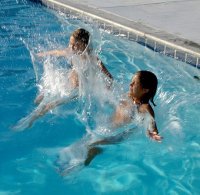Summer Matters: How Parents Can Keep Their Children Learning All Summer Long
Now that school is out and summer is here, parents are the best front line for making sure that their children continue to keep their minds and bodies active during summertime. Why does summertime learning matter so much? Because when students lack access to high-quality summer learning and enrichment opportunities, they risk falling prey to "summer learning loss" -- a loss in academic skills and knowledge during summer vacation.
Because summer learning loss is cumulative over time, it leads to increased dropout rates among those students who have fallen behind.
Missing out on summer learning is as harmful to children's physical health as it is to their academic health, because students who lack access to summer learning opportunities are less likely to be physically active and more likely to spend their days watching TV and eating junk food -- and sedentary behaviors are contributing to America's exploding childhood obesity epidemic.
With only 90 days of summer, every day a student is not participating in summer learning is a loss by every measure. Fortunately, there are numerous easy, effective and affordable ways that parents can help keep their children learning -- and moving -- all summer long, in ways that are as fun as they are educational. Better yet, all the resources they need to engage their children in summertime learning that can keep them academically and physically healthy are either at home or close to home.
Finding the Right Program
First, parents can search for free or low-cost, high-quality summer learning programs in their local communities. Research shows that students who take part in high-quality summer learning programs that combine academics, enrichment and physical activity benefit from substantial improvements in their academic achievement, vocabulary and reading skills, social skills, work habits and attitudes, and readiness to learn.
To help determine whether a summer learning program is a high-quality one, start by looking for these six elements when assessing a program:
- A program that broadens students' horizons -- by exposing them to new adventures, skills and ideas. These could be activities like going on a nature walk, using a new computer program, giving a presentation, visiting a museum or attending a live performance.
- A program that includes a wide variety of activities -- such as reading, writing, math, science, arts and public service projects -- in ways that are fun and engaging.
- A program that helps students build mastery -- by helping them improve at doing something they enjoy and care about. This could be anything from creating a neighborhood garden to writing a healthy snacks cookbook to operating a robot.
- A program that fosters cooperative learning -- by working with their friends on team projects and group activities such as a neighborhood clean-up, group presentation or canned food drive.
- A program that promotes healthy habits -- by providing nutritious food, physical recreation and outdoor activities.
- A program that lasts at least one month -- giving kids enough time to benefit from their summer learning experiences.
Family Fun
Parents can also do a great deal to support their children’s summer learning through educational and engaging home-based activities that will help keep them mentally and physically fit, and ready to start the new school year with success. Here are five ways to get started:
- Read to your children -- or encourage your children to read -- books recommended by their teachers, your local library and online summer reading lists. Sign up for your library's Summer Reading Program, which offers incentives for summertime reading.
- Visit free local learning resources in your community that are entertaining, educational and close to home, such as libraries, parks, museums, universities and recreation centers.
- Play fun math and word games that turn everyday household activities into learning opportunities. For example, have your kids add up prices at the grocery store and challenge them to tally up the final bill. When going on drives, ask them to look for certain shapes, colors, letters or words on billboards and signs.
- Ask your children's teachers to recommend engaging, grade-appropriate educational activities that you can easily access online and download for free.
- Get moving and get healthy. Turn off the TV, computer and video games (or at least put limits on screen time), and keep your kids moving with physical activities that also encourage learning. For example, organize a scavenger hunt that leads them around a local playground, park or museum.
With a little time, planning and creativity, parents can play an important part in making sure that every summer matters in advancing their children's learning, health and well-being.
